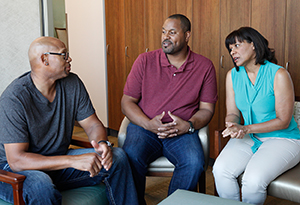Dealing with Discrimination When You Have HIV

We've come a long way in our understanding of HIV and AIDS. But there is still discrimination against people living with HIV. There have been many advances in early diagnosis and treatment. This has made it possible to live a normal life with the disease, as people often do with other long-term (chronic) illnesses. But the greatest challenge for many people is still the stigma that goes along with the illness.
You may worry about what others will think about you having HIV. You may also fear having others know certain things about you. These include:
-
You are gay or bisexual
-
You had many sex partners in the past
-
You have had an HIV-positive partner
-
You have a history of injection drug use
These worries and fears can then help lead to behaviors that put you and others at risk. These behaviors can include:
-
Not getting tested for HIV
-
Not using condoms
-
Hiding an HIV-positive status from sex partners
-
Not getting medical care that can save or prolong your life
-
Not taking medicine as directed
-
Hiding health problems from your family
Homophobia and fear of people with HIV and AIDS are very strong in the African-American community and some other cultures. These fears mean that many people are afraid to admit their sexual orientation or HIV-positive status. For these reasons, many prefer to risk infection rather than face the stigma of being known to be living with HIV.
The reality of discrimination
Negative beliefs about people with substance use disorder may lead to discrimination against people who were infected with HIV through injection drug use. These negative beliefs include the idea that substance use disorder is a moral failing. And the idea that people with a substance use disorder can’t or won’t change. These prejudices have slowed the availability of treatment centers for people who use drugs. Because of this, people who are HIV-positive, use injection drugs, and have a different racial, religious, economic, or ethnic background often face stigmas. This heavy burden can increase isolation, anxiety, distress, and depression among those who are HIV-positive.
Taking action to overcome discrimination
You have many ways to take action to reduce the stigma and discrimination you may be facing:
-
Educate yourself and others. Discrimination against people with HIV is often rooted in a lack of understanding about the virus and how it spreads. Contact your healthcare provider or local public health department. They can help you find community-based organizations that provide HIV information, counseling, and testing.
-
Know your rights. Federal law protects people with disabilities. This includes those with HIV, from discrimination. Laws, such as the Americans with Disabilities Act (ADA) and the Fair Housing Act, protect your rights in the workplace, in housing, and in other settings. For example, the ADA requires employers to accommodate the needs of workers with disabilities, such as HIV or AIDS. This is true as long as they can still do the required tasks of their job.
-
Be an advocate. One of the best ways to fight discrimination is to work to help change policies that stop people with HIV from getting the care, housing, and respect they need.
-
Think about being open with those you can trust. You can choose who to tell about your HIV status. Not all of your friends and loved ones have to know. You need to think about who can give you the support and comfort you deserve. It may be stressful to talk about your HIV status. But being able to confide in people you trust and getting the support you deserve will be a big relief. It's also good to remember that you can't control other people's prejudices. Prepare for possible negative reactions, at least at first.
-
Get support. Studies show that people with strong social support are less likely to feel stigmatized than those who are isolated. Contact your healthcare provider or local public health department or hospital if you're uncomfortable getting comfort from friends and family. They can help you find HIV support groups in your community. Think about volunteering to give support to others with HIV if you already have a close network.
Online Medical Reviewer:
Barry Zingman MD
Online Medical Reviewer:
L Renee Watson MSN RN
Online Medical Reviewer:
Raymond Turley Jr PA-C
Date Last Reviewed:
8/1/2023
© 2000-2024 The StayWell Company, LLC. All rights reserved. This information is not intended as a substitute for professional medical care. Always follow your healthcare professional's instructions.